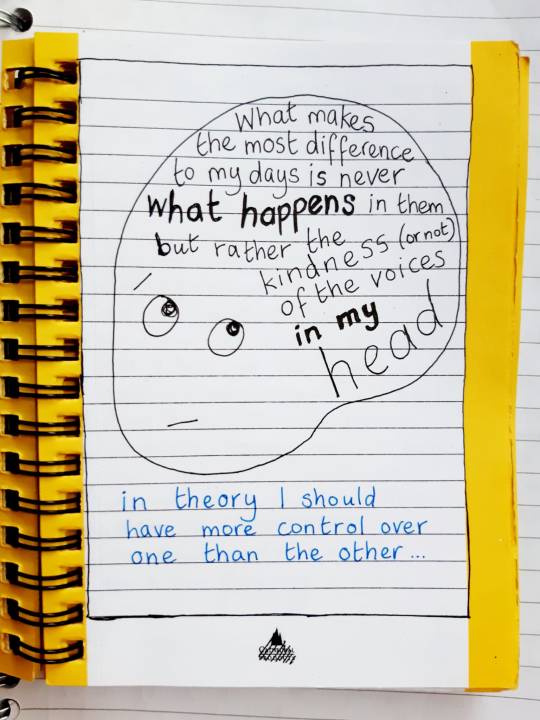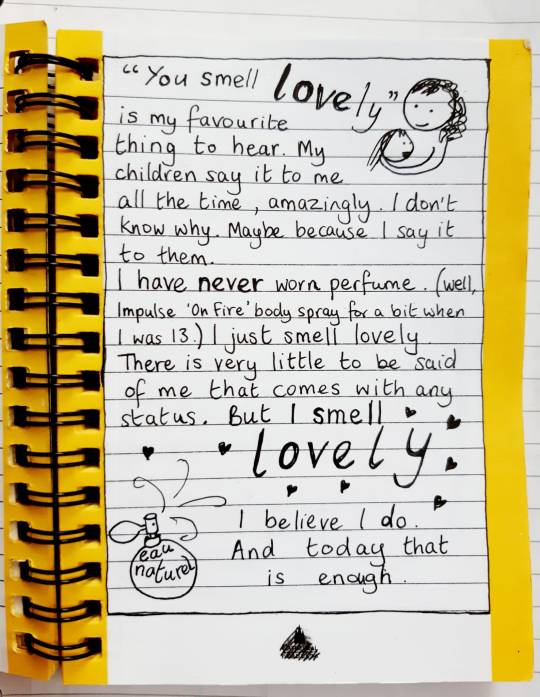
Image by Zoe Gardner @limberdoodle
Am I good enough?
Yes.
You are.
I could end the blog right here, since that is the main point already made, but seeing as I am also the anxious ‘I’ asking the question, as well as the apparently self-assured one answering, I will unpack it a little more.
I ask the question ‘Am I good enough?’ or versions of it – is what I make good enough? Or any good at all? Is this blog worthwhile? Is the novel I have just finished (after 10 years) worthy of publishing, or an embarrassment? Etc. – on a regular basis. I am as desperate for validation as the next woman. In fact, at times I have worried that I am more desperate, indecently so. You see, perhaps louder than the obvious villain- the inner critic that gives me and my work scathing reviews – is the voice that considers even the act of asking the question – am I good enough? – to be an incriminating one.
Let me fill out these critical voices a bit. I find it useful to give them names, characters. I am going to call the anxious, insecure voice Matty (my least favourite nickname when I was at school). She is, as described above, desperate. A young girl in baggy, multi-coloured clown trousers, trying to be cool, looking odd (me, as a teenager). The obvious inner villain, the one who likes to rip me and my work to shreds, I imagine to be a man. I call him Basil, after Basil Rathbone, with whom as a child I was slightly infatuated when he acted in the role of Sherlock Holmes. He is intelligent, shrewd, unromantic, uncompromising, and sexist. He finds the idea of much of my writing, and of Mothers who Make itself, slightly distasteful. The other inner critic – the one who considers the entire question of ‘being good enough’ to be beside the point- is a woman, in a paint-spattered boiler suit, a fierce feminist, activist and artist- let’s call her Ida, short for idealistic. She believes the ‘am I good enough?’ question to be a demeaning, self-indulgent one. The point is the practice. The work. The question derives from a purely egotistical need for affirmation. “You just want a hit – don’t you?“ she says. “You want to be able to go on Facebook and see if anyone has left any nice comments underneath your blog? Have you noticed that there’s a war on? There is untold suffering in the world, and you are worrying about whether you’re ‘good enough’ or not??!!!“ She turns her back in disgust. Matty feels even more terrible. Basil gives a disdainful sneer.
And so on. And so forth.
They bicker on inside me.
It’s exhausting, tedious and highly unproductive.
I have lived with these voices for a long time. Most of us have – if not the three I have named, then your very own variation of inner villains, critics or self-doubters. Earlier in my life, the constant back and forth of mine manifested as anorexia, a paradoxical condition that was simultaneously a cry for help and a statement of fierce autonomy, of being so beyond the need for help that I didn’t even require something as basic as food to support me. I was a young, anxious Matty, an arrogant, bony Basil, and a fierce, militant Ida, all in one. Nowadays, thank goodness, a little more kindness has entered my inner dialogues, and much of this is down to my experience of being a mother.
As a mother, the voices, and the needs that drive them, are no longer only internal, but are external, immediate and palpable. All day long, in a thousand different ways, my main job- I have discovered over the last decade- is to try to let my children know that they are good enough – more than good, more than enough, fundamentally, unconditionally. Just to take a few examples from the last 48 hours:
I held my son while he had a panic in the night, until his breathing calmed.
I hung in there with my daughter while she hollered for an hour on the beach because we had forgotten to bring her pink spade.
I listened and nodded whilst my son explained to me the finer points of difference between Skyrim and Oblivion (his favourite video games).
I helped my daughter choose between a pack of bubbles and a heart-shaped rubber as a prize at an amusement arcade.
In every case, the task in hand was essentially the same: to validate my children, who they are, what they are feeling, what matters to them.
I don’t always manage it. Not by a long shot. I lose it more than I care to admit. And what I lose, when I do, is not only or even mainly my temper- I lose touch with the understanding that it’s my job to affirm my kids – not necessarily to agree with them, but always to let them know that they are valid.
It is a hard job. Hard because of the world and what it is like. Hard because of my children and their neurodiversity, and what they are like. Hard because of me and what I’m like, and hard because it just is hard.
But worthwhile.
Because when I manage it, when I do give my children a sense of their good enough-ness, what happens?
They go forth and make stuff.
They make games, drawings, stories. They make up jokes, strange cake recipes and new yoga moves.
They can’t help themselves. They just do it.
And they do this not because they are brilliant creative individuals (though -I’m their mum- so of course I think they are), but because this is what human beings do when we are feeling okay about ourselves – we make stuff.
It’s worth noting that this process is reciprocal. Whilst I do my level best to be an affirming voice for my children, they effortlessly, consistently, affirm me, because that’s what children do. I remember when they were babies, I found it slightly alarming, because so unfamiliar, to witness the way in which they turned eyes on me that were brim-full with the message that I was enough. As their mother, I was exactly ‘the enough’ they needed. Even now, when I regularly get told I am the worst mummy in the world, ultimately, they validate me, and I know this has changed me – it has made me a calmer, less angst-ridden kind of maker.
What is useful about observing this process of validation that takes place again and again between my children and me, is that it gives me a new perspective on my inner critics and their arguing – in fact it reverses the whole dynamic. It makes it clear that my creative work need not be a means to prove or disprove my worthiness, depending on whether or not I make anything ‘good enough,’ but could in fact be the result of my already being enough. This is creative practice figured as a kind of wonderful by-product of being alive. When I understand this, it makes everyone inside me settle down, and even grow wise. In fact, an incredible thing happens: my critics transform from enemies into allies. Like the three wise kings, they each bear gifts. My anxious Matty part feels heard and can assert that her need for validity is in itself a valid need, not to be dismissed. Basil knows all about an unquestioned sense of self – his job as Sherlock is to question everybody else, but to be quite sure of himself. He has the medicine and experience Matty needs. And Ida is pleased because, when the flow of energy works in this direction, ‘Am I good enough?’ genuinely become a redundant question- the point is the practice, and how ever the work turns out is a matter of keen interest but not a matter of life or death, does not impact on the value of anybody’s life. Ida, therefore, can stop preaching and instead offer her passion to support the creative process.
That’s the theory anyway – and it does, has definitely helped, my practice.
For a while, I’ve been talking about offering an online ‘Inner Critic’ workshop for Mothers Who Make, and now that I have finished my novel and am quietly freaking out about whether it is any good (hence this blog), I think the time might have come for me to give it a go. So, if you want to try out naming your inner critics and, I hope, turning them into allies, let me know.
This pilot workshop will be held online on Thursday 12th May 10am-12pm BST. Children, and all manner of critics, are welcome. Contact me at matilda@motherswhomake.org if you are interested. You don’t have to be ‘good’ in order to take part – whether you believe it or not, you already are. More than good. More than enough.
And, in the meantime, here are your questions for the month (and some optional homework in prep for the workshop):
How and for what do you judge yourself?
What are the precise words you use? The intonation of the voice?
Or is it not a voice at all, but an image? An action?
And when, if ever, have you known that you are wholly, and unquestionably, enough?

Image by Zoe Gardner @limberdoodle

0 Comments